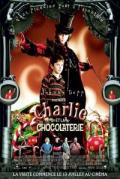Details

- Title
- Charlie and the Chocolate Factory
- Director
- Tim Burton
- Cast
- Johnny Depp, Freddie Highmore, David Kelly, Helena Bonham Carter, Noah Taylor, Missi Pyle, James Fox, Deep Roy, Christopher Lee, Adam Godley, Franziska Troegner, Annasophia Robb, Julia Winter, Jordan Fry, Philip Wiegratz
- Length
- 115 min.
- Released
- 2005
Review
We always knew Jhonen Vasquez wished he were Tim Burton. It turns out the opposite is true, too. In fact, given the evidence of Charlie and the Chocolate Factory, there is hardly anyone Tim Burton doesn't wish he was.
Like the Gene Wilder classic, the film is built in two rough sections: Charlie with his family and Charlie in the factory. Unlike the 1971 version, which is typically fast-forwarded through until Charlie stops singing about having recieved a Golden Ticket, Tim Burton fares very much better with the parents than with Willy Wonka himself. The Buckets' expressionistic house is designed something like a softer version of Das Kabinett des Doktor Caligari, Burton wishing himself into a serviceable (if pointless) Robert Wiene imitation. The garishly overdesigned factory interiors show his decision to switch, midstream, into a bad Dr. Seuss imitation. Something like Mike Myers' The Cat in the Hat.
While the family dynamic is genuinely sweet, and frequently funny, powered by a commanding performance by Freddie Highmore (The next Haley Joel Osment? This kid's the original Haley Joel Osment, sucker), all this is lost when Tim Burton turns on the overdrive and the bitter taste of desperation starts to leak through. From the moment we step through the doors of the factory we are not given a single moment of reprieve from his bombastic and pre-calculated Sense of Wonder. This is amusing for about ten minutes, then we start to realize what has happened: Tim Burton has given up on the movie and started to build up, from its discarded carcass, an advertisement for itself. "Look at me!" the film shouts at us, bouncing around like one of the film's bratty kids we're supposed to dislike.
Actually, there are a few moments where Tim Burton steps back from the overdone factory for ham-handedly segued flashbacks. These are designed to explain the psychological forces behind Willy Wonka's weirdness. They go into great detail demonstrating his dentist father's disdain for candy and other defining traumas. Really, they only needed to explain that Wonka's father was Christopher Lee. This is one step worse than Vincent Price on the guaranteed-to-mess-you-up scale.
Much of the film is amusing, but considerably more of it is disappointing. Half of the time we are embarassed, not just for Tim Burton but for ourselves in the audience. We start nervously looking back and forth about midway through the second Oompa-Loompa song, worried that somebody might see us.
Johnny Depp, Freddie Highmore and Christopher Lee escape relatively unscathed. Only Highmore impresses, though, Depp and Lee are simply adequate but unassailable.
Tim Burton is not alone in needing to learn some CG restraint. Practically all of Hollywood (and with particular aplomb George Lucas) uses digital effects in the place of filmmaking. Tim Burton had always been reasonably stylish, but here he has mistaken style for excess. The wonder of seeing something that we know is not real is in being able to believe that it is real. Though she blows up bigger and bluer, this Violet's transformation is never wonderful, never amusing, never interesting. Hollywood is concerned about the video game industry taking away from its profits. What they don't understand is that the only reason people tolerate video games that look like video games is the control. If a movie looks like a video game it is nothing. It is worthless. This is the fundamental failure of Charlie and the Chocolate Factory.
- Rating
- 3/8
- Reviewer
- Pat Jackson
- Published